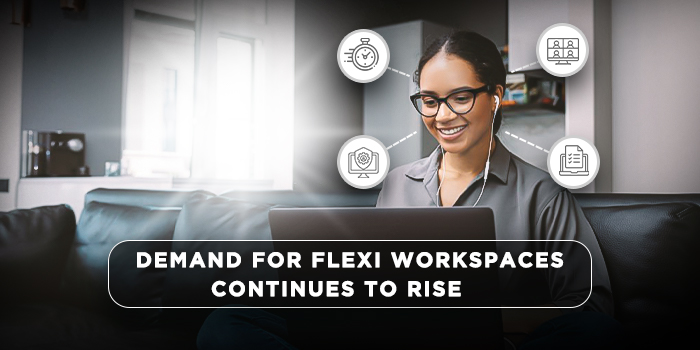The Covid pandemic which has turned the world upside down, has also severely disrupted the corporate world, forcing employers to rethink and re-strategize workforce management so that their business and operations stay nimble and rationalized. With lockdowns and restrictions slapped to guard against the pandemic, often working out of the headquarters was not a viable option, leading to the proliferation of co-working flexi workspaces. Companies focused on decentralizing their workforce, with satellite offices linking with the HO in a hub-and-spoke model.

Flexi workspaces enable employees to work from anywhere (often their hometown) and give the management ample scalability options in the future. While the pandemic has abated in most regions, corporate captains and HR managers are wary of yet another wave lurking round the corner. For new businesses in particular, where minimizing cost is critical, investing in real estate is an added fiscal load which most of them would rather avoid.
For these entities, managed workspaces offer the desired flexibility and a hassle-free work environment minus the furrows of leases and agreements.It helps startups to integrate business technology as a category without having to worry about operational responsibilities. Besides, they can later evolve as and when they need to.
In fact, a recent CII report has predicted that the market size of co-working flexi workspaces would double over the next 5 years at a CAGR of 15%. This is because in India and globally, the rate of recovery and economic growth has been very slow post-pandemic and the future remains uncertain with mini-aggravations of Covid cases at regular intervals across various geographies. Hence corporate entities still deem it fit to keep downsizing their HOs and keep the faith in managed workspaces, which also gives them the elasticity to expand in desired demographics.
Another big factor in the rising demand for flexi workspaces is the increasing role of freelancers. With massive job cuts forced by the Covid menace, there’s a whole lot of serious talent out there, plying their trade as freelancers and at very reasonable cost to the corporate houses which are absorbing them into the system, usually in managed workspaces.
Such plug-and-play workspaces are still much in demand since it provides the flexibility so vital to have in a hybrid model. Also, one doesn’t need to invest too much in infrastructure or in capex, while enjoying multiple options close to the hub. Besides, these flexi spaces are great for work meetings, very often the most significant activity these days in headquarters, with the employees often delivering in remote mode.
Many companies, particularly in the IT/ITeS sector, have hired robustly over the past 2 years, but not invested in additional workspaces. Quite naturally, the demand for managed, flexi co-working spaces continues to rise with the luxury of minimum lock-in for the companies.
Also, many employees are not too keen to leave their respective hometowns and move to a different city any longer, given the uncertain future. Hence, to retain the finest of talent, the IT behemoths must continue to invest in the hub-and-spoke flexi workspace model. That has been fueling demand for managed office spaces continuously. According to research conducted by the Pioneer Property marketing team, the share of flexi office space came to around 17% of the total workspaces leased out over the past 18 months. This would translate into over 75,000 seats leased out.
All the established co-working and managed office space operators like Awfis, WeWork and Smartworks declare that they have been getting enquiries for flexible workspaces from all sizes of enterprises, big, small and medium, and that the northward curve continues unabated.
The work from anywhere model is likely to remain in currency for quite some time, it seems and the flexi workspaces will continue to cater to this demand, thus ensuring a conducive work ambience and high productivity for employees, while reducing travel time and giving them better work-life balance that they pine for, and minimum capital expenditure for the corporate managements, besides the room to scale up and down, as the situation demands.
Disclaimer : Information contained and transmitted by us are for information purposes only. All views and/or recommendations are those of the concerned author personally and made purely for information purposes. Nothing contained in the articles should be construed as business, legal, tax, accounting, investment or other advice or as an advertisement or promotion of any project or developer or locality. Pioneer Property Management Ltd. does not offer any such advice. No warranties, guarantees, promises and/or representations of any kind, express or implied, are given as to (a) the nature, standard, quality, reliability, accuracy or otherwise of the information and views provided in (and other contents of) the articles or (b) the suitability, applicability or otherwise of such information, views, or other contents for any person’s circumstances. We shall not be liable nor shall be held responsible in any manner for any action taken based on the published information (whether in law, contract, tort, by negligence, products liability or otherwise) for any losses, injury or damage (whether direct or indirect, special, incidental or consequential) suffered by such person as a result of anyone applying the information (or any other contents) in these articles or making any investment decision on the basis of such information (or any such contents), or otherwise. The users should exercise due caution and/or seek independent advice before they make any decision or take any action on the basis of such information or other contents.